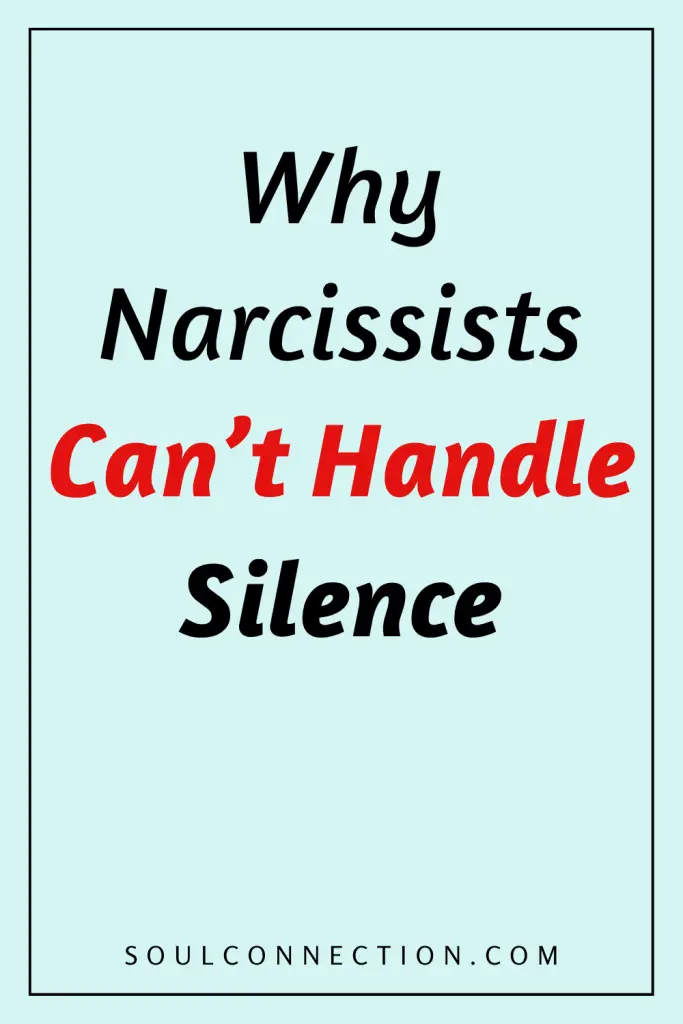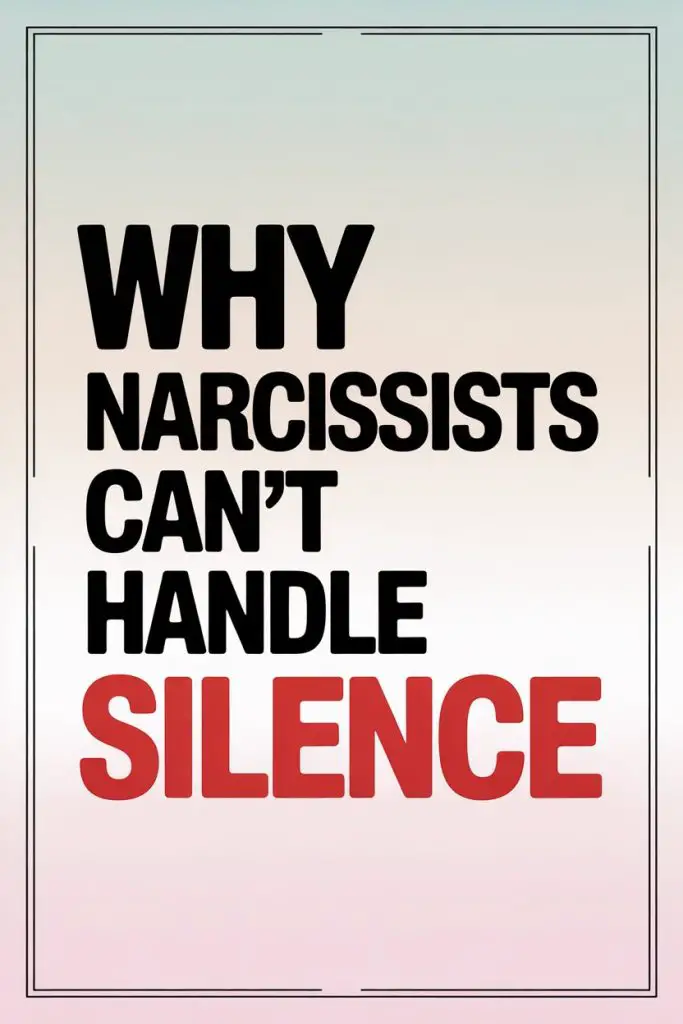Silence is golden—unless you’re dealing with a narcissist. For most people, a lull in conversation can be peaceful, even restorative. But for the narcissist? Silence is about as comfortable as a porcupine in a balloon shop.
Beneath their charm and confident exterior lies a discomfort with quiet that’s as telling as a toddler’s meltdown when you hide their favourite toy.
What is it about silence that gets under their skin? Grab your mug (of whatever’s stronger than tea if you need it), and let’s unravel why narcissists just can’t sit with the sound of nothing.
The Need to Control the Narrative
Ever noticed how a narcissist has the stamina of a marathon runner when it comes to talking about themselves? Give them a stage—metaphorical or otherwise—and they’re the star, director, and sometimes even the entire audience.
Silence, though, steals the spotlight. It’s a vacuum, and vacuums eagerly suck away their carefully curated narrative. Suddenly, they’re not steering the ship.
The conversation isn’t theirs to direct, and that’s as unsettling for them as a GPS rerouting mid-journey.
When you go quiet—whether intentionally or just because you’re tired of hearing about their third story this week about how they single-handedly saved the office—the narcissist senses a loss of control. That loss? It’s intolerable.
Silence Feels Like Rejection
Narcissists are experts at sniffing out slights—real or imagined. When you stop talking, they don’t just hear quiet; they hear an alarm bell: “You don’t care about me. You think I’m boring. You’re punishing me.”
Any silence is interpreted as a personal affront.
Mature adults can sit together on a car ride and enjoy the scenery, maybe the radio. A narcissist in that scenario? They’re internally screaming, “Why aren’t you adoring me right now?”
They thrive on a constant drip of attention and validation. The minute it stops, they spiral, convinced you’re ice-cold or, worse, plotting to dethrone them from their position as King or Queen of the universe.
Ego Feeds on Noise
Think of the narcissist’s ego as a hungry toddler. Silence is not a snack; it’s a skipped meal. The narcissist chases validation, needing every conversation to go a certain way (spoiler: it ends with them being praised, pitied, or envied).
Noise—talk, laughter, even arguing—feeds that ego. Silence? That’s ego fasting, and fasting never made anyone happy (just ask anyone who’s tried intermittent fasting before coffee).
In the absence of chatter, the narcissist’s mind starts to churn. If they’re not being admired out loud, are they being criticized in silence? Paranoia creeps in.
Suddenly, they’re convinced your silence is anything but neutral.
Silence Is an Unwelcome Mirror
Silence can force reflection. For most people, that’s not always pleasant, but it’s healthy. For a narcissist, self-reflection is the stuff of nightmares.
When there’s nothing to distract them—no one to impress, no drama to stir—they might catch a fleeting glance at themselves without their usual armor. That’s terrifying.
Self-doubt, regret, and vulnerability are emotions they avoid like the plague.
Filling the air with words is their way of keeping their inner critic locked up. Silence threatens to let that critic loose, and they’ll do anything to avoid that.
The Fear of Losing Influence
Narcissists are addicted to influence. They want to shape how others feel, think, and act.
When you fall silent, you step out of their sphere of influence. They can’t sway your words or reactions because you’re giving them… nothing. Silence is your power move, and they know it.
Watch how quickly a narcissist tries to break an awkward silence: jokes, accusations, love-bombing, or even starting a row just to get a reaction. Anything is better than the feeling that they’ve lost their grip.
Conflict Without Resolution
Silence can be a powerful response in an argument—sometimes it’s wiser to step back than fuel the flames. For a narcissist, though, silence isn’t space to cool off; it’s a challenge.
They crave resolution on their terms, which usually means you apologizing, reassuring, or accepting blame.
When you offer no words, it throws them into disarray. They can’t read your mind or predict your next move, and they certainly can’t force closure.
Expect a flurry of texts, guilt trips, or grand declarations to fill the void you’ve left.
Validation Withdrawal Feels Like Starvation
Narcissists are validation vampires. They don’t sparkle in the sun, but they do wither without constant external affirmation.
Silence is the sound of the tap being turned off. No compliments. No agreement. Not even a good old-fashioned argument to confirm that, yes, you’re still emotionally invested.
Some will go to extraordinary lengths to break the silence—provoking you, love-bombing, even pretending to be vulnerable. Anything to get some validation back on tap.
The Anxiety Behind the Mask
That charming bravado? It’s a mask. Underneath, narcissists often feel deeply insecure and anxious.
Silence strips away their audience. They’re suddenly alone with their thoughts, and those thoughts are rarely kind. “What if they don’t care? What if I’m boring? What if I’m not important?”
Cue anxiety. The compulsion to fill every gap is a way to avoid feeling that discomfort.
They Assume the Worst
Where one person might see silence as comfortable companionship, the narcissist assumes catastrophe.
Maybe you’re plotting their downfall (highly unlikely unless you’re auditioning for a soap). Maybe you’re losing interest. Maybe you’ve finally seen through the façade.
Their mind doesn’t stop with neutral explanations. It leaps to the worst possible conclusion—and then acts on it. Expect a text, a call, or even a dramatic “Are you mad at me?” performance.
Silence Threatens Their False Self
Narcissists build a persona—a carefully sculpted “false self” they present to the world. It’s grand, admirable, and always in need of reinforcement.
Silence is a threat to that construction. Without constant interaction, the cracks show.
No one is admiring, laughing, or clapping. The mask slips, if only for a moment, and the real person underneath feels exposed.
That’s why they’ll do almost anything to fill the silence—even if it means starting a pointless argument or hijacking a conversation that wasn’t even about them to begin with.
How To Use Silence Strategically
Now for the good bit: what can you actually do with all this information besides diagnosing your least favorite dinner guest?
Silence, when used with intent, can be your friend. If you’re dealing with a narcissist—at work, at home, or in the queue at the coffee shop—try these tactics:
- Resist the urge to fill the silence. You’re not on a game show where dead air costs points.
- Use silence after setting a boundary. Watch what happens. You might be surprised at how quickly they scramble to reassert control or change tactics.
- Practice “grey rocking.” Minimal responses, minimal emotion. Silence isn’t coldness; it’s self-preservation.
- Don’t over-explain. A narcissist loves to drag you into endless justifications. Sometimes, “I don’t want to discuss this right now” is enough.
Above all, remember: you don’t owe anyone a performance.
When Silence Isn’t Golden
There’s a difference between using silence as a tool and using it to manipulate or punish. Some narcissists will employ the infamous “silent treatment” as a weapon, leaving you anxious and desperate to break the ice.
If you’re on the receiving end of this, recognize it for what it is: an attempt to regain power by making you chase after them. Don’t fall for it.
True emotional connection isn’t built on fear of silence or the need to constantly fill it.
A Quiet Revolution
Learning to be comfortable with silence is a gift—to yourself, and sometimes, as a not-so-subtle boundary with the narcissist in your life.
It’s a space for reflection, self-respect, and—if you’re lucky—a little peace and quiet before the next round of “Guess What Amazing Thing I Did Today?”
If you’ve ever wondered why the narcissist in your life can’t sit still in a silent room, now you know: it’s not you, it’s them. And sometimes, the best response really is no response at all.
Tea, anyone?


